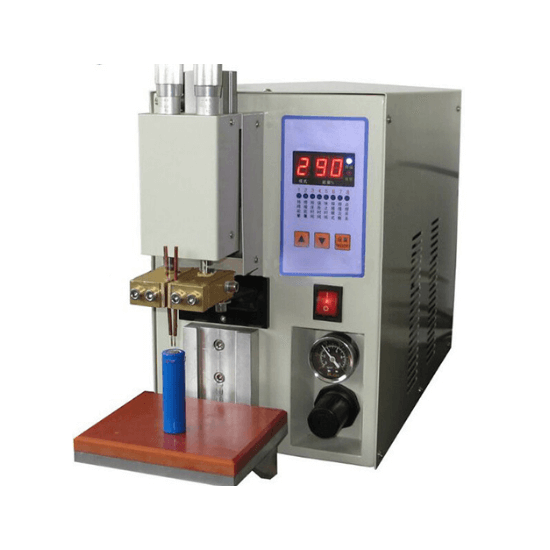Lith Corporation, founded in 1998 by a group of material science doctor from Tsinghua University, has now become the leading manufacturer of battery lab&production equipment. Lith Corporation have production factories in shenzhen and xiamen of China.This allows for the possibility of providing high quality and low-cost precision machines for lab&production equipment,including: roller press, film coater,mixer, high-temperature furnace, glove box,and complete set of equipment for research of rechargeable battery materials. Simple to operate, low cost and commitment to our customers is our priority.
Nickel Strip Spot Welding Machine
Benchtop Hydraulic Press: A Comprehensive Guide
A benchtop hydraulic press is a compact and versatile machine designed for applying high pressure in laboratory, workshop, or industrial settings. It is commonly used for tasks such as forming, molding, cutting, bonding, and assembly. These presses are ideal for smallscale operations where portability, ease of use, and affordability are key considerations.
Below is an indepth exploration of benchtop hydraulic presses, including their types, components, applications, advantages, and pricing.
●1. What Is a Benchtop Hydraulic Press?
A benchtop hydraulic press is a smaller version of a traditional hydraulic press that can be mounted on a workbench or table. It uses hydraulic fluid to generate force, allowing precise control over pressure and movement. The compact design makes it suitable for limited workspace environments while maintaining the power and functionality required for various applications.
●2. Types of Benchtop Hydraulic Presses
A. By Force Capacity
1. LowForce Presses:
Typically rated up to 10 tons (20,000 lbs).
Ideal for lightduty tasks like sample preparation or smallpart assembly.
2. MediumForce Presses:
Rated between 10–50 tons (20,000–100,000 lbs).
Suitable for mediumduty applications such as metal forming or composite bonding.
3. HighForce Presses:
Rated above 50 tons.
Used for heavyduty tasks like forging or largescale material processing.
B. By Operation Method
1. Manual Presses:
Operated by hand levers or foot pedals.
Costeffective but slower than automated systems.
2. SemiAutomatic Presses:
Incorporate basic automation features like programmable pressure settings.
Balance cost and efficiency.
3. Fully Automatic Presses:
Controlled via digital interfaces with advanced sensors and feedback systems.
Expensive but highly precise and efficient.
●3. Components of a Benchtop Hydraulic Press
1. Frame:
Supports the press structure and ensures stability during operation.
2. Hydraulic Cylinder:
Converts hydraulic fluid pressure into mechanical force.
3. Pump:
Supplies hydraulic fluid to the cylinder under controlled pressure.
4. Platen:
The movable platform that applies pressure to the workpiece.
5. Control System:
Includes valves, switches, and digital displays for regulating pressure, speed, and position.
6. Safety Features:
Emergency stop buttons, overload protection, and guards to prevent accidents.
●4. Applications of Benchtop Hydraulic Presses
A. Laboratory Use
Sample compression for testing materials.
Pelletizing powders for analysis (e.g., Xray diffraction).
B. Manufacturing
Forming metals, plastics, or composites.
Bonding layers of materials together (e.g., laminates).
C. Automotive Industry
Pressfitting components like bearings or bushings.
Repairing or assembling parts.
D. Electronics
Assembling printed circuit boards (PCBs) or bonding electronic components.
E. Education and Research
Demonstrating principles of hydraulics and mechanics.
Conducting experiments on material properties.
Spot Welding Machine
●5. Advantages of Benchtop Hydraulic Presses
1. Compact Design:
Fits easily on workbenches or tables, saving floor space.
2. Versatility:
Handles a wide range of materials and applications.
3. Precision Control:
Allows accurate adjustment of pressure and stroke length.
4. CostEffectiveness:
More affordable than larger industrial presses.
5. Safety:
Designed with safety features to minimize risks during operation.
●6. Limitations of Benchtop Hydraulic Presses
1. Limited Force Capacity:
Smaller presses may not handle extremely heavyduty tasks.
2. Smaller Work Area:
Restricted platen size limits the size of workpieces that can be processed.
3. Maintenance Requirements:
Regular upkeep is necessary to ensure optimal performance and prevent leaks.
4. Initial Cost:
Highend models with advanced features can still be expensive.
●7. Pricing of Benchtop Hydraulic Presses
The cost of a benchtop hydraulic press depends on factors such as force capacity, automation level, brand, and additional features. Below are approximate price ranges:
| Type | Price Range |
|||
| Basic Manual Models | $500–$2,000 |
| SemiAutomatic Models | $2,000–$8,000 |
| Fully Automatic Models | $8,000–$20,000+ |
Factors Influencing Price
1. Force Capacity: Higher tonnage presses cost more.
2. Automation Level: Fully automatic systems are pricier than manual ones.
3. Brand and Quality: Reputable brands often charge a premium for reliability and support.
4. Additional Features: Advanced controls, sensors, or custom platens increase the price.
●8. Popular Brands Offering Benchtop Hydraulic Presses
Here are some wellknown brands that manufacture benchtop hydraulic presses:
| Brand | Key Features |
|||
| Carver Inc. | Known for precision presses used in laboratories and research facilities. |
| Wabash Power | Offers durable and versatile presses for industrial applications. |
| Husky Hydraulics | Provides costeffective solutions with a focus on reliability and performance. |
| Thermo Scientific| Specializes in laboratorygrade presses for analytical and material testing. |
●9. Future Trends in Benchtop Hydraulic Presses
1. Smart Technology Integration:
Incorporation of IoT, AI, and data analytics for realtime monitoring and optimization.
2. Energy Efficiency:
Development of ecofriendly hydraulic systems with reduced energy consumption.
3. Customization:
Modular designs allowing users to configure presses for specific applications.
4. Enhanced Safety:
Improved safety mechanisms to protect operators from accidental injuries.
●10. Conclusion
Benchtop hydraulic presses are indispensable tools for smallscale manufacturing, laboratory work, and educational purposes. Their combination of power, precision, and portability makes them ideal for a variety of applications. When selecting a benchtop hydraulic press, consider your specific needs, budget, and longterm goals to choose the right model.
If you're looking for guidance on purchasing or using a benchtop hydraulic press, feel free to ask!

 English ▼
English ▼ English ▼
English ▼ ONLINE
ONLINE +86 13174506016
+86 13174506016 Louis@lithmachine.com
Louis@lithmachine.com +86 18559646958
+86 18559646958
 18659217588
18659217588